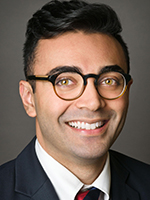Many of the things we do as doctors continue simply because “that’s the way we’ve always done it,” says Abraar Karan
 “Anyone who tells you that you can get any rest in the hospital is full of sh*t.” Not the usual way I expect to start off my morning rounds, but the patient had a point. Between having his vital signs checked every four hours (the tight squeeze of the blood pressure cuff, the unapologetic beep of the thermometer), a tangle of wires restricting any reasonable movement (one was his oxygenation probe, the other his cardiac telemetry), and the incessant commotion of the night team admitting a new patient behind his curtains, I couldn’t blame him.
“Anyone who tells you that you can get any rest in the hospital is full of sh*t.” Not the usual way I expect to start off my morning rounds, but the patient had a point. Between having his vital signs checked every four hours (the tight squeeze of the blood pressure cuff, the unapologetic beep of the thermometer), a tangle of wires restricting any reasonable movement (one was his oxygenation probe, the other his cardiac telemetry), and the incessant commotion of the night team admitting a new patient behind his curtains, I couldn’t blame him.
That day on rounds, our team discussed whether he truly needed to have his vital signs checked overnight—they had been relatively stable for a few days. Similarly, his oxygenation levels had never really been a concern. He did initially require telemetry, but his heart rate had been relatively well controlled. We ultimately discontinued these monitoring measures—both to give him more comfort, but also because he no longer really needed any of them from a clinical perspective.
The reality of medicine is that there are many things we as doctors do for absolutely no reason. That is to say, there is no evidence (randomised controlled trial or otherwise) for doing them, other than “that’s the way we’ve always done it.”
Some of this unnecessary medicine is propagated by what behavioural economics call the “default effect”—which essentially says that a user will pick the default option unless the cost of switching to a different option is less than the cost associated with keeping the default.
In this case, the electronic medical record order set at my hospital has “Q4 hour vitals,” “EKG monitoring,” and “continuous O2 monitoring” set as default options when a patient is admitted. The same is true for daily laboratory values, such as “complete blood counts,” “basic metabolic panels,” and “liver function tests.” For most admissions, it is common for these options to never be unclicked or changed to “once” so as to establish a baseline set of lab values.
I think much of this comes down to the fact that doctors are not the ones paying for the labs, are not the ones actually drawing them, and are not the ones being stuck by needles to have them taken. Consequently, doctors experience little to no cost associated with keeping daily monitoring going. This is true as well for overnight vitals, which the patient care assistant (PCA) or nurse has to physically measure. If doctors had to actually act on many of the orders they place, I guarantee that most, if not all, of the unnecessary ones would quickly disappear.
Over the past few years, we’ve seen a growing awareness that these trends are problematic and the Choosing Wisely Campaign, which aims to cut down on unnecessary tests, treatments, and procedures, has taken off internationally. As part of this initiative, the Journal of Hospital Medicine started a series of articles on “Things We Do for No Reason.” Some of their most recent examples on common practices that have no robust data behind them include overtreatment of hypertensive urgency and the hospitalisation of patients presenting with low risk chest pain.
So how do we change this? One operational shift would be to start a daily “Unnecessary Checklist,” which could incorporate questions including, “Does my patient still need: Daily labs? Overnight vitals? Telemetry or pulse oximetry? Finger stick glucose checks? Deep venous thrombosis prophylaxis? Dietary restrictions? Bed restrictions?” among many other regularly ordered items.
Secondly, physicians should recognise the need to question practices that have otherwise become reflexive. Are there data behind why we are doing this? If there are not, why are we doing it, and what unnecessary discomfort and work does it impose upon patients, nurses, PCAs, phlebotomists, pharmacists, and others on the team, not to mention the increased financial costs to the system and, ultimately, the patient?
In medicine, there is a cultural deference to tradition and seniority, but that doesn’t always translate into the best clinical care. Lastly, while this is certainly not the responsibility of patients in any way, I would encourage all patients to question why something is being done if they are unsure. No question is a bad question, and ultimately you have every right to have any intervention, no matter how simple, explained and justified to you.
As doctors, we have come to forget the consequences of our clicks. Multiple daily blood draws can lead to iatrogenic anemia; overnight vitals disrupt sleep, which is a major risk factor for hospital-induced delirium; continuous pulse oximetry and telemetry can contribute to alarm fatigue, and over-reaction to otherwise normal variations in heart rate and oxygenation; overly restrictive diets for patients who are having trouble eating can lengthen hospitalisations and worsen nutrition (a recent JAMA study actually highlights a lack of data for sodium restriction even in heart failure patients).
Ultimately, doing things for no reason can unintentionally harm patients. I think we can all agree that there is no reason for that.
Abraar Karan is an internal medicine resident at the Brigham and Women’s Hospital/ Harvard Medical School. Twitter @AbraarKaran
Competing interests: None declared.
The opinions expressed in this article are solely those of the author and do not reflect the views and opinions of Brigham and Women’s Hospital.
